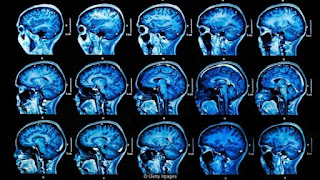Dementia
Dementia is
a general term for a decline in mental ability severe enough to interfere with
daily life. Memory loss is an example. Common type of dementia is Alzheimer's
disease, Other common
types include vascular dementia, Lewy body dementia, and frontotemporal
dementia. Less common
causes include normal pressure hydrocephalus, Parkinson's disease, syphilis,
and Creutzfeldt–Jakob disease among others. There is no known cure for dementia. Globally, dementia affected about 46
million people.
Early stages
The person
can usually still take care of him or herself but may forget things like taking
pills or doing laundry and may need prompting or reminders. Other signs might be getting lost in
new places, repeating things, personality changes, social withdrawal and
difficulties at work.
In
Alzheimer's dementia the most prominent early symptom is memory difficulty.
Middle stages
People with
Alzheimer's dementia in the moderate stages lose almost all new information
very quickly. People
with dementia may be severely impaired in solving problems, and their social
judgment is usually also impaired. hey may be able to do simple chores around the house but not
much else, and begin to require assistance for personal care and hygiene other
than simple reminders
Late stages
People with
late-stage dementia typically turn increasingly inward and need assistance with
most or all their personal care. Persons with dementia in the late stages
usually need 24-hour supervision to ensure personal safety.
Diagnosis
The symptoms are very
similar, and it is usually difficult to diagnose the type of dementia by
symptoms. Some mental illnesses, including
depression and psychosis, may produce symptoms that must be differentiated from
both delirium and dementia.
- Cognitive Testing
- Laboratory Tests
- Imaging




Comments
Post a Comment